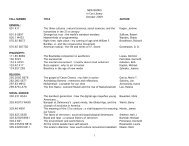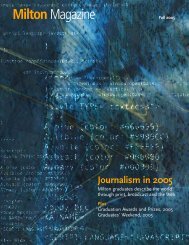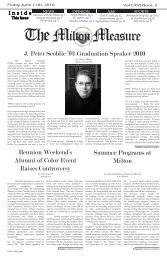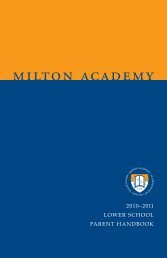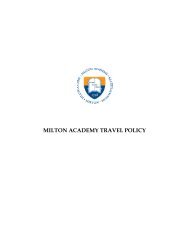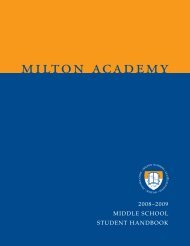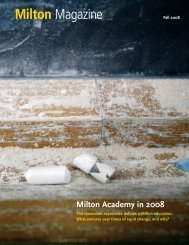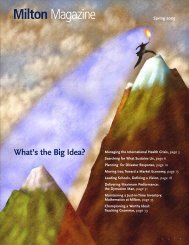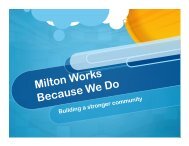Spring 2007 - Milton Academy
Spring 2007 - Milton Academy
Spring 2007 - Milton Academy
- No tags were found...
You also want an ePaper? Increase the reach of your titles
YUMPU automatically turns print PDFs into web optimized ePapers that Google loves.
Theo Spencer ’84“People tend to think of global warming as ahuge, overwhelming problem. The truth isthat there are common-sense solutions that wecan adopt to solve the problem—solutions thatare both good for the economy and good forthe health of our environment. We need tothink and act optimistically. We need to looktoward new technologies rather than relyingon the old ones.”The National Resources Defense Council(NRDC) defines its work as maintainingthe integrity of nature’s resources. It“seeks to establish sustainability and goodstewardship of the earth as central ethicalimperatives of human society.”This sense of responsibility for the earthdrew Theo Spencer ’84 to work withNRDC’s Climate Center, one of the organization’sseveral program areas. TheClimate Center works to establish policieswithin the United States that help diminishthe major causes of global warming.Headquartered in New York, with othermain offices in Washington, D.C., LosAngeles, San Francisco, Chicago, andBeijing, the NRDC and its Climate Centeradvocates passing legislation that wouldreduce emission of heat-trapping gasessuch as carbon dioxide (CO2). One part ofan emissions policy promoting globalwarming solutions is a cap-and-trade system.It creates a financial incentive forcleaning up dirty power plants and manufacturingemission-reducing vehicles byappointing a cost to polluting.“One of my focuses has been on New YorkState vehicle laws,” Theo explains. “Toreduce emissions, I’ve worked to enact theCalifornia tailpipe CO2 standards andmake them apply in New York. Recently,my focus has been mainly on the interiorWest—states like New Mexico, Colorado,Theo Spencer ’84Montana, Arizona, Nevada—and I amworking on clean energy policies in thoseareas as well.”Before Theo joined the NRDC, he studiedjournalism and wrote for various newspapersand magazines, including Fortune.During that time, he served on the boardof the New York State EnvironmentalGroup. “As I became more interested inthis, I became less interested in my otherwork,” Theo says. He left his job at Fortunethe same time that the NRDC was given alarge gift allowing them to start a new programarea focused exclusively on globalwarming. Theo began by handling communicationsfor the organization, butmade his way to the campaign and policywork full-time, where his passion is.“I got into this work not because I am outcamping all the time, but out of a senseof justice and injustice,” Theo explains.“People are doing things to the environmentthat are just outrageous. It’s an issueof fairness and responsibility. I’m not lookingfor everyone to be conscious of this outof altruism necessarily, but I want to makesure that people are doing what is right ina larger sense—that there are laws in placeand that these laws are being followed.“Right now I am working on fighting aproposal in Texas; TXU is looking to build11 or so coal-fired power plants using oldand highly polluting technology. Coal-firedpower plants are the single largest cause ofglobal warming pollution in the UnitedStates. I am spending time speaking withlocal officials and other environmentalgroups to fight the building of theseplants. For my work in the interior West,I work with governors’ offices, state agencies,and other interest groups.”While tackling the larger issues that contributeto global warming, Theo points outthat each of us can do our part to diminishour carbon footprints. “My advice is to buyefficient appliances, use compact fluorescentlightbulbs, pay attention to the type ofcar that you buy. Most importantly, payattention to local and state politics. Bevocal about the candidates who approachthe idea of energy and the environment ina responsible way.”www.nrdc.orgLafcadio Cortesi ’79Using the marketplace to protect borealforests, key regulators of climate changeLafcadio Cortesi ’79 remembers spendingsummers during high school doing volunteerwork on the behavior of temple monkeysin Nepal—an adventure that “turned[his] world on its head.” These experiencesprecipitated his professional life’s trajectoryand purpose. For the past 20 years,Lafcadio has worked in North America andthe Asia Pacific—from Indonesia to Papua,New Guinea, to Micronesia—facilitatingenvironmental sustainability and justice.Fascinated by the intersection of culture,ecology and economics, Lafcadio is basedin the San Francisco Bay Area, where heworks with Forest Ethics as the directorof Boreal Markets and Solutions. Mostrecently he has focused on market-basedapproaches to transforming business models.“It’s fertile ground for growing the23 <strong>Milton</strong> Magazine



